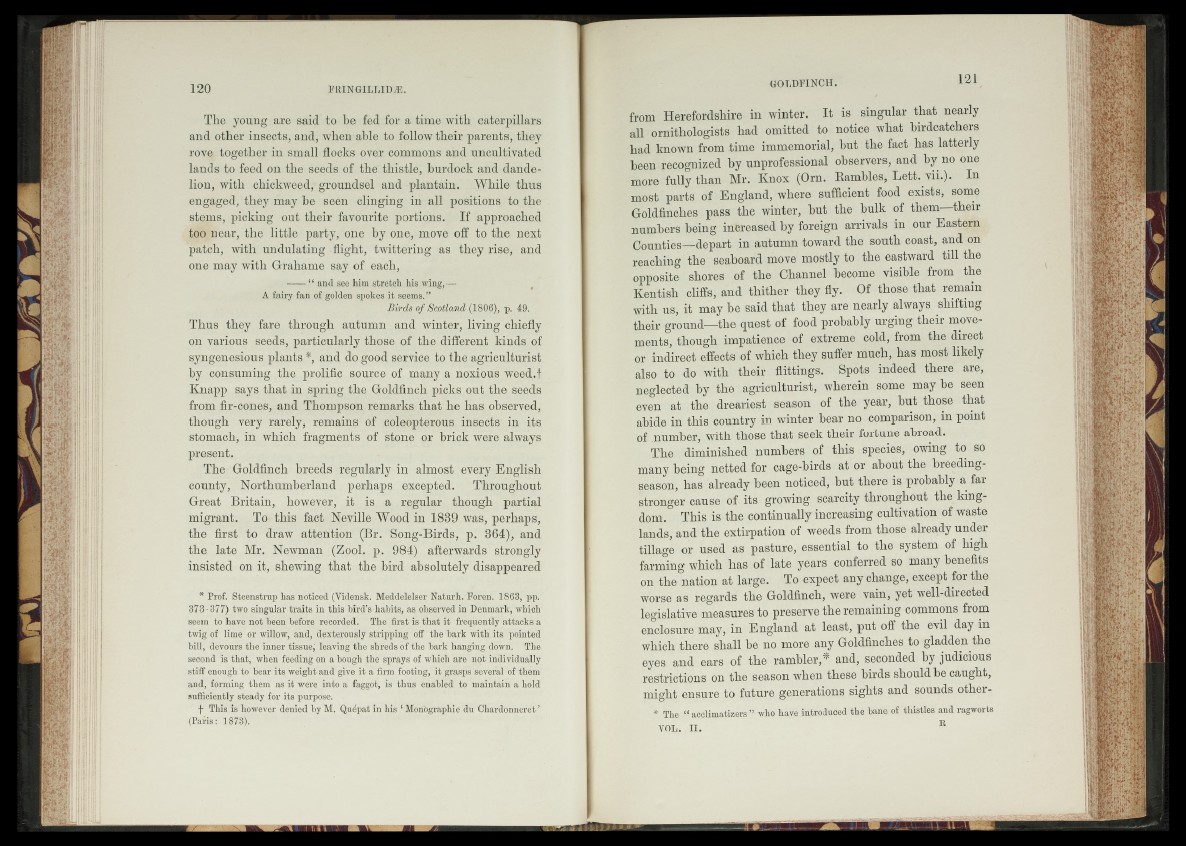
The young are said to be fed for a time with caterpillars
and other insects, and, when able to follow their parents, they
rove together in small flocks over commons and uncultivated
lands to feed on the seeds of the thistle, burdock and dandelion,
with chickweed, groundsel and plantain. While thus
engaged, they may he seen clinging in all positions to the
stems, picking out their favourite portions. If approached
too near, the little party, one by one, move off to the next
patch, with undulating flight, twittering as they rise, and
one may with Grahame say of each,
----- “ and see him stretch his wing,—
A fairy fan of golden spokes it seems.”
Birds of Scotland (1806), p. 49.
Thus they fare through autumn and winter, living chiefly
on various seeds, particularly those of the different kinds of
syngenesious plants *, and do good service to the agriculturist
by consuming the prolific source of many a noxious weed.f
Knapp says that in spring the Goldfinch picks out the seeds
from fir-cones, and Thompson remarks that he has observed,
though very rarely, remains of coleopterous insects in its
stomach, in which fragments of stone or brick were always
present.
The Goldfinch breeds regularly in almost every English
county, Northumberland perhaps excepted. Throughout
Great Britain, however, it is a regular though partial
migrant. To this fact Neville Wood in 1889 was, perhaps,
the first to draw attention (Br. Song-Birds, p. 364), and
the late Mr. Newman (Zool. p. 984) afterwards strongly
insisted on it, shewing that the bird absolutely disappeared
* Prof. Steenstrup has noticed (Yidensk. Meddelelser Naturh. Foren. 1863, pp.
373-377) two singular traits in this bird’s habits, as observed in Denmark, which
seem to have not been before recorded. The first is that it frequently attacks a
twig of lime or willow, and, dexterously stripping off the hark with its pointed
bill, devours the inner tissue, leaving the shreds of the hark hanging down. The
second is that, when feeding on a hough the sprays of which are not individually
stiff enough to hear its weight and give it a firm footing, it grasps several of them
and, forming them as it were into a faggot, is thus enabled to maintain a hold
sufficiently steady for its purpose.
f This is however denied by M. Quepat in his ‘ Mon'ographie du Chardonneret ’
(Paris: 1873).
GOLDFINCH. 121
from Herefordshire in winter. It is singular that nearly
all ornithologists had omitted to notice what birdcatchers
had known from time immemorial, hut the fact has latterly
been recognized by unprofessional observers, and by no one
more fully than Mr. Knox (Orn. Kambles, Lett. vii.). In
most parts of England, where sufficient food exists, some
Goldfinches pass the winter, hut the hulk of them—their
numbers being increased by foreign arrivals in our Eastern
Counties—depart in autumn toward the south coast, and on
reaching the seaboard move mostly to the eastward till the
opposite shores of the Channel become visible from the
Kentish cliffs, and thither they fly. Of those that remain
with us, it may he said that they are nearly always shifting
their ground—the quest of food probably urging their movements,
though impatience of extreme cold, from the direct
or indirect effects of which they suffer much, has most likely
also to do with their Sittings. Spots indeed there are,
neglected by the agriculturist, wherein some may be seen
even at the dreariest season of the year, hut those that
abide in this country in winter hear no comparison, in point
of number, with those that seek their fortune abroad.
The diminished numbers of this species, owing to so
many being netted for cage-birds at or about the breeding-
season, has already been noticed, but there is probably a far
stronger cause of its growing scarcity throughout the kingdom.
This is the continually increasing cultivation of waste
lands, and the extirpation of weeds from those already under
tillage or used as pasture, essential to the system of high
farming which has of late years conferred so many benefits
on the nation at large. To expect any change, except for the
worse as regards the Goldfinch, were vain, yet well-directed
legislative measures to preserve the remaining commons from
enclosure may, in England at least, put off the evil day in
which there shall be no more any Goldfinches to gladden the
eyes and ears of the rambler,* and, seconded by judicious
restrictions on the season when these birds should be caught,
might ensure to future generations sights and sounds other*
The “ acclimatizes ” who have introduced the bane of thistles and ragworts
VOL. I I. B